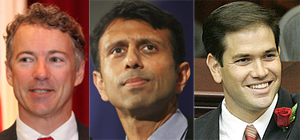The Future of Conservatism is Now
 Over the next four years, conservatism begins the process of identifying itself for the 21st century, and the process will begin with three young politicians: Rand Paul, Marco Rubio and Bobby Jindal. Scott Rasmussen prophesied that 2012 was to be the last election that the Republican establishment would decide the nominee. CPAC 2013 showed the future of the conservative movement as well as its past. Reporter Byron York summed up Paul and Rubio by noting Paul was biting and challenging while Rubio was reassuring and smooth.
Over the next four years, conservatism begins the process of identifying itself for the 21st century, and the process will begin with three young politicians: Rand Paul, Marco Rubio and Bobby Jindal. Scott Rasmussen prophesied that 2012 was to be the last election that the Republican establishment would decide the nominee. CPAC 2013 showed the future of the conservative movement as well as its past. Reporter Byron York summed up Paul and Rubio by noting Paul was biting and challenging while Rubio was reassuring and smooth.
Rand Paul called for change and added, “The Facebook generation can detect falseness and hypocrisy a mile away. They want leaders that won't feed them a line of crap or sell them short. They aren't afraid of individual liberty…Our party is encumbered by an inconsistent approach to freedom. The new GOP, the GOP that will win again, will need to embrace liberty in both the economic and personal sphere... The new GOP will be founded on a new generation."
Rand Paul did not view his filibuster as just about drones but the limitation of Presidential authority. During the filibuster, Paul did two things. He rallied the troops, but he also exposed fissure among conservatives on foreign policy. Paul wants America to retreat to a non-interventionist policy.
Marco Rubio's message was simpler and Reaganesqe as he noted, “What I sense from a lot of people that I've been talking to is this fear that somehow America has changed, that our people have changed, I want you to understand that's not true. Our people have not changed.” He pointed out the charitable qualities of American people who go to Church on Sunday and to work on Monday. Rubio concluded, "As soon as I'm done speaking, I'll tell you what the criticism on the left will be, he didn't offer any new ideas. Well, we don't need a new idea. There is an idea. The idea is called America. And it still works."
Marco Rubio made the case that Reagan would have made, America's ideals of limited government, dependence upon imagination of the entrepreneurs to create opportunities and freedom is still the best idea. The contrast between Paul and Rubio to Obama, who believes that growth originates from Washington, is stark. Both believe in the power of the American people to shape their destiny, but they still have differences in what America's role should play in the world.
Meanwhile on state levels, many Republican governors have shown that the principle of limited government does indeed work. One of those governors is another preemptive Presidential nominee Bobby Jindal. Jindal, the son of immigrants from India, has proven to be a successful governor in a state noted for colorful and occasionally corrupt governors. Jindal's first introduction to the public was what many considered a disastrous response to Obama's first State of the Union in 2009, but his leadership during the BP spill and his competence in governing Louisiana has prompted new enthusiasm that maybe he is Presidential timber. Jindal is leading a charge for fundamental changes in the Louisiana tax codes by eliminating the income and corporate taxes in favor of consumption taxes. Before that, he made efforts to allow parents more choices in educating their children, but the plan is now in the courts as the left and teacher unions fight efforts to reform education.
Rand Paul and Marco Rubio talk of limited government but Jindal is making it work in Louisiana by reforming the tax system, keeping Louisiana's budget in line, and reforming education to benefit low income families. He is actually designing a platform that will allow Republicans to go behind its traditional base and move into Middle America and many minority communities.
Rubio, Paul and Jindal will represent the various ideology strain of the conservative movement. Paul is the libertarian wing, and while he is pro-life like the other two, he will move Republicans into a more libertarian stance on issues like same-sex marriage and drug legalization. He will seek to restrict presidential authority, whereas Rubio will be more interventionist in foreign policy.
Jindal is a social conservative, and while his economic policy is liberty oriented, his view on same-sex marriage will be the opposite of Paul's. Over the next three years, there will be a lively debate over what it means to be a conservative. The left has already decided what it will be. The more moderate forces have been routed, and the hard left has taken over the machinery of the Democratic Party. The left is modeling itself after the European democratic socialists with the bureaucratic state running the economy. Many conservatives feel the time has come to say stop to the development of an American bureaucratic state, and Paul, Rubio, and Jindal are looking to produce a vision that speaks to the best of America.




Comments
Facebook Comments
Make sure to check out the comments on Facebook.